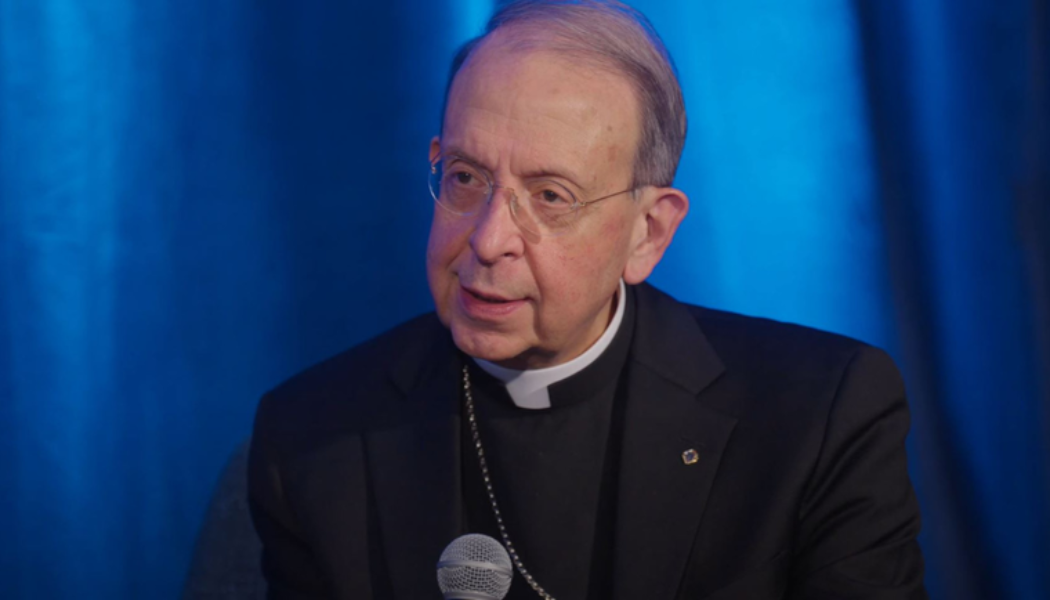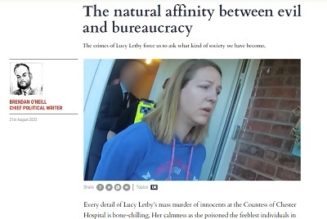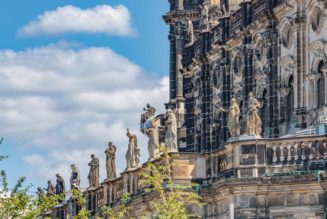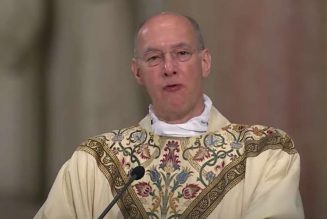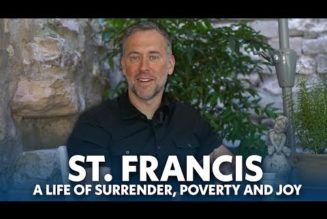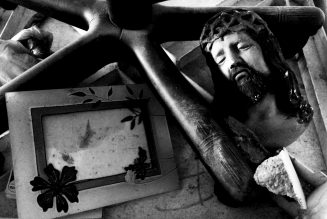
Promoting synodality in the United States depends more on a conversion of heart than on the creation of new structures, the U.S. bishops emphasized at their fall assembly in Baltimore.
“It’s about cultural change, not necessarily structural change or not necessarily canonical changes, but first and foremost a change in how we can relate one to another and the Body of Christ,” said Archbishop William Lori of Baltimore at a Nov. 13 press conference at the U.S. Conference of Catholic Bishops (USCCB) meeting.
The USCCB’s vice president, Archbishop Lori was one of five bishops who had been tapped by the conference to take part in last month’s Synod on Synodality session in Rome, which brought to a close a four-year process initiated by Pope Francis aimed at discerning how to make the Church more inclusive and participatory.
Throughout the Nov. 11-14 assembly in Baltimore, several bishops who had participated in the synod shared with the assembly and the press that the Church in the United States is already uniquely blessed with the kinds of practices and consultative bodies called for by the synod’s final document, such as finance and pastoral councils.
For instance, USCCB president Archbishop Timothy Broglio spoke of the “country’s rich history of promoting co-responsibility” in his opening remarks on Nov. 12, before noting in his presidential address that some synod participants “were surprised” at how prevalent synodal structures already are in the United States.
“Many of the synodal exercises that are common in our country wait to be introduced elsewhere,” he said, before listing six different consultative structures that are widespread in the U.S., including a National Advisory Board and presbyteral councils.
However, Bishop Daniel Flores of Brownsville, Texas, warned that without a deeper conversion to authentic listening and encounter, already existing consultative structures will not live up to their potential.
“Without that humility, the structure won’t really help,” said Bishop Flores, the USCCB’s doctrine committee head and point man on the Synod on Synodality.
Bishop Flores stressed that listening goes beyond treating someone like a mere “source of information,” but is a spiritual discipline that one can’t “get from an online course.”
The Brownsville bishop said that although the U.S. is blessed by a number of consultative structures, it could learn from other parts of the universal Church where a “village” mentality is still prevalent. He also stressed the importance of listening to the poor and communities that have withstood the “onslaught of modern technology” for insights into how to truly listen to others.
Bishop Flores said that the Pope’s publication of Dilexit Nos, an encyclical on the Sacred Heart of Jesus, in the midst of the Synod on Synodality session, provided a key lens for how to understand synodality, an interpretation that was also advanced by papal nuncio Cardinal Christophe Pierre in his Nov. 12 address to the U.S. bishops.
Starting Local
Both Archbishop Lori and Bishop Flores emphasized the importance of promoting a synodal culture at the local level.
Archbishop Lori spoke of inviting his pastoral council and other diocesan bodies to prayerfully read the Synod on Synodality’s final document and discern “what it means for us and how we’re going to try to live that our as we go forward.” He also spoke of the importance of pastors recognizing the gifts of others, inviting them to participate.
“Pastors who do this and have done this their whole life as priests, chances are those are the places where the churches are full on Sunday,” he said, underscoring that listening doesn’t mean that “faith and morals are up for grabs.”
Bishop Flores emphasized the importance of pastors being “accessible” to their people, which he said was a reflection of the incarnation of Jesus Christ, who became physically present among his people. He also said Christ was never afraid to listen to someone else in the course of his outreach, and all Catholics should follow his lead.
“Quit judging the person before you actually try to understand the way they speak,” he said.
Changes Coming
Although local Churches have been encouraged to begin implementing synodality, Bishop Flores noted in his Nov. 12 presentation to the assembly that some decisions at the universal level, including those involving the synodal reform of canon law, will be made by Pope Francis himself.
“And I don’t think the Holy Father is at all shy about taking decisions when he’s ready,” said Bishop Flores.
Bishop Flores also emphasized the need for ongoing work on the theological underpinnings of synodality, including the nature of the episcopal conferences and an understanding of how the “sense of the faithful” can and cannot be gauged through consultative bodies.
He also spoke of the need to strengthen ecclesial bonds at the national and continental level, but also stressed that the work of an episcopal conference “cannot and should not supplant the local decisions of the local diocesan Churches.”
Campaigning?
Another theme that emerged multiple times at the USCCB assembly was the idea that agenda-driven approaches were present at and detracted from the Synod on Synodality. Archbishop Lori, for instance, said in his report to the assembly that there was “a bit of campaigning in the room” at the synod, a view that Archbishop Broglio endorsed.
“It is not easy to listen and set aside the campaign positions that sometimes colored the approaches of certain participants,” said Archbishop Broglio in his presidential address. “There is still an occasional sentiment that if I do not get what I want, the Church is not being synodal.”
The bishops did not explicitly name any issues that were being lobbied for at the Synod on Synodality, but activists promoting causes like the ordination of women and softening the Church’s moral prohibition of same-sex relations were present both inside and outside of the synodal hall.
“We have to grow in our understanding and in our ability to listen to the Holy Spirit,” added Archbishop Broglio.
Synodality ‘Task Force’
One development that emerged at the USCCB assembly was clear support for the creation of a dedicated task force to explore how to implement synodality within the episcopal conference.
The proposal initially was made from the floor on Nov. 12 by Cardinal Robert McElroy of San Diego, who was one of five U.S. prelates tapped by Pope Francis to participate in the recent synod. A voice vote of the gathered bishops, with not a single dissenting voice, confirmed that the USCCB’s priorities and plans committee should move forward with preparing the task force on synodality.
Prior to the assembly in Baltimore, Cardinal McElroy and Cardinal Blase Cupich of the Archdiocese of Chicago, another papal nominee to the synod, had publicly called for synodality to be addressed by the USCCB in the form of a dedicated committee, a more substantial body than a task force.
The USCCB has already taken steps to make its assemblies more synodal, including round-table seating arrangements, time for small-group discussions, and the executive sessions, which allow for more free flowing discussion without the presence of media.
Whatever comes next, Archbishop Lori said that his experience of the Synod on Synodality final session’s long and sometimes grueling monthlong schedule was a good chance to cultivate the virtues needed for a synodal reform to bear fruit.
“It is a long-haul proposition,” he said. “Building a synodal Church is going to require a lot of patience, a lot of perseverance, and a certain spiritual discipline.”
